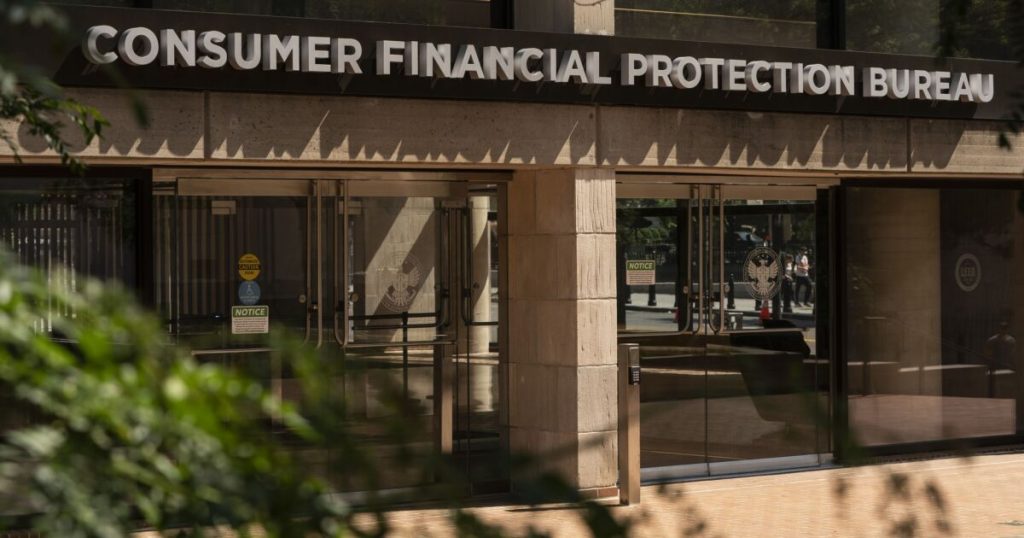- What’s at Stake: Banks want a level playing field with nonbanks and bank trade groups say the proposal would create a major imbalance in regulation.
- Supporting Data: The CFPB’s proposal would cut to 26, down from 2,600, the number of nonbanks potentially subject to supervisory exams and oversight.
- Forward Look: The CFPB currently is not conducting any supervision or enforcement of any companies, so it is unclear how much of a difference a final rule would make.
Bank trade groups and consumer advocates — two groups rarely in agreement — have found common ground in pushing back against the Consumer Financial Protection Bureau’s plan to cut supervision of nonbanks.
The CFPB issued a proposed rule last month that would slash the number of nonbanks being supervised in four key markets: auto finance, consumer credit reporting, debt collection and international money transfers. The bureau received
The Dodd‐Frank Act explicitly requires the CFPB to identify so-called “larger participants” in specific markets and to supervise nonbanks operating in those markets to protect consumers’ interests. The CFPB has broad discretionary authority over which larger participants it chooses to supervise.
Two bank trade groups, the Consumer Bankers Association and Bank Policy Institute, said the CFPB “must consistently supervise” nonbanks with the “same rigor” as depository institutions.
“When nonbanks are allowed to operate with lighter or fragmented oversight, it distorts markets, undermines fair competition, and risks harm to consumers,” wrote Rachel Ross, the CBA’s vice president and associate general counsel in a joint letter with Paige Pidano Paridon, BPI’s executive vice president and senior associate general counsel. “Left unchecked, it encourages regulatory arbitrage, undermines responsible providers’ ability to compete in the marketplace, and creates a race to the bottom in consumer protection.”
The bank trade groups also emphasized that Congress recognized that without affirmative supervision and examination by the CFPB, nonbank entities “could engage in unlawful behavior and harm consumers.”
The CFPB has exclusive authority to supervise banks with more than $10 billion in assets, covering more than 180 banks and bank affiliates. It also has authority to supervise all nonbank lenders to ensure they are complying with 18 federal consumer financial laws.
Several data resellers pushed back on the CFPB’s proposal by claiming they should not be categorized as credit reporting agencies and should not be measured in comparison to large banks.
“With the stroke of a regulatory pen, small businesses with a limited market role were put under the same regulatory burdens as multinational banks,” wrote Eric J. Ellman, president of the National Consumer Reporting Association.
Some experts said the proposal would result in a major imbalance in regulation.
“If the largest of the larger participants are still subject to supervision, but everybody else isn’t, then that immediately creates sort of an imbalance in regulatory burden and pressure,” said Chris Willis, a partner at Troutman Pepper Locke, who has discussed the larger participant rule on
Acting CFPB Director Russ Vought has been busy revisiting and undoing the actions of its predecessors. On Aug. 8, the CFPB issued four advanced notices of proposed rulemaking that would raise the threshold for nonbanks subject to supervision. The proposed rule would dramatically cut oversight of hundreds of nonbanks to “reduce compliance burdens,” and “avoid the diversion of CFPB limited resources.”
The CFPB asked for comment on
But the CFPB is already not conducting any supervision or enforcement of any companies, according to several lawyers and CFPB employees, who spoke on the condition of anonymity out of fear of retaliation by the Trump administration.
Mit Shah, the co-founder and chief operating officer at Method Financial, an Austin, Texas-based business-to-business software provider, asked the CFPB to narrow the bureau’s “existing, expansive interpretation of the consumer reporting marketplace.”
He suggested that the CFPB exempt consumer-permissioned data access platforms like Method from being defined as consumer reporting agencies under the Fair Credit Reporting Act.
Shah said the proposal would impose “a significant and disproportionate compliance burden for smaller market entities without any meaningful improvement to consumer benefits or protections. Over time, such an approach could force consolidation in the consumer-permissioned data access marketplace, undermining the Bureau’s efforts over the last many years to increase competition.”
Hallee Morgan, the American Bankers Association’s vice president and senior counsel for regulatory compliance and policy, said that risks posed by nonbanks are not necessarily proportional to the size of a company.
“Congress did not give the Bureau supervisory authority over the ‘largest’ participants in each market, but over ‘larger participants’ in the market,” Morgan wrote. “ABA believes this choice of language reflects Congress’ intention for the bureau to have supervisory authority over a broad range of nondepository consumer financial products and service providers, and raising the ‘larger participant’ threshold contravenes Congress’ intent.”
Consumer advocates also raised similar concerns, noting that simply by having a meaningful presence as a financial watchdog keeps bad practices in check.
“The potential changes discussed in the ANPRs, if implemented, will send a message to companies that violations of law will be ignored, and to consumers that their most powerful financial watchdog is not going to look out for them,” wrote Erin Witte, director of consumer protection at the Consumer Federation of America.
It is unclear if the CFPB intends to supervise nonbanks given that Vought is focused on potentially
Moreover, the CFPB has stated that it

